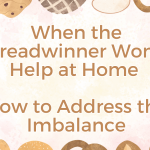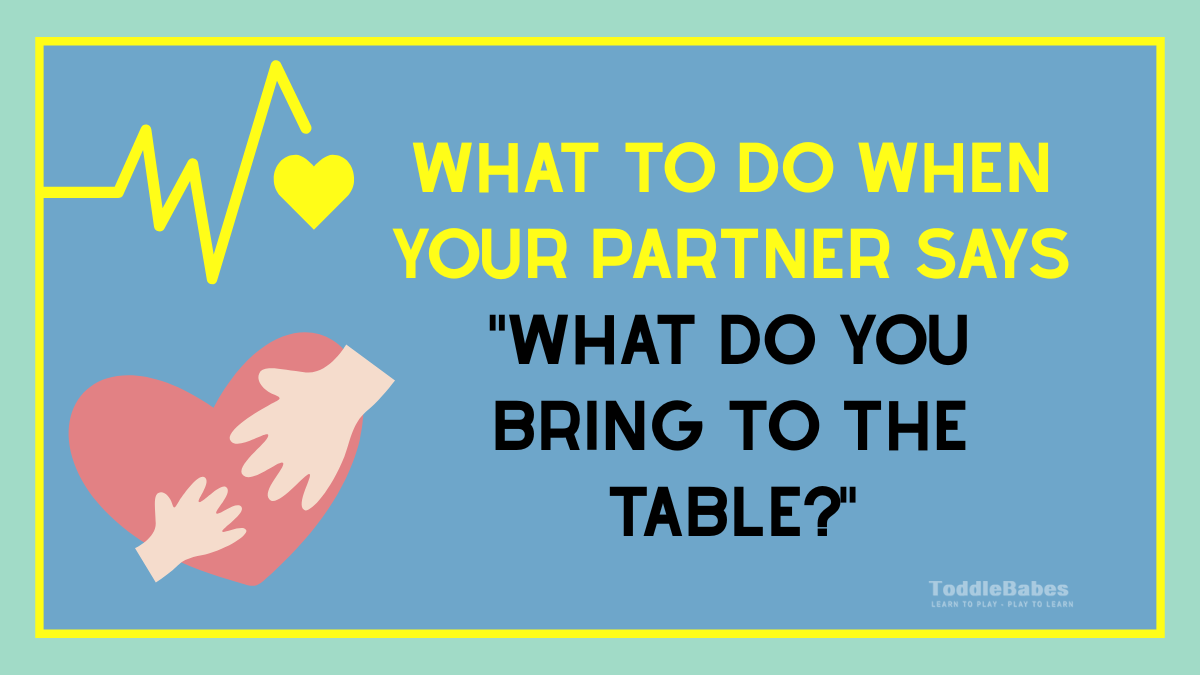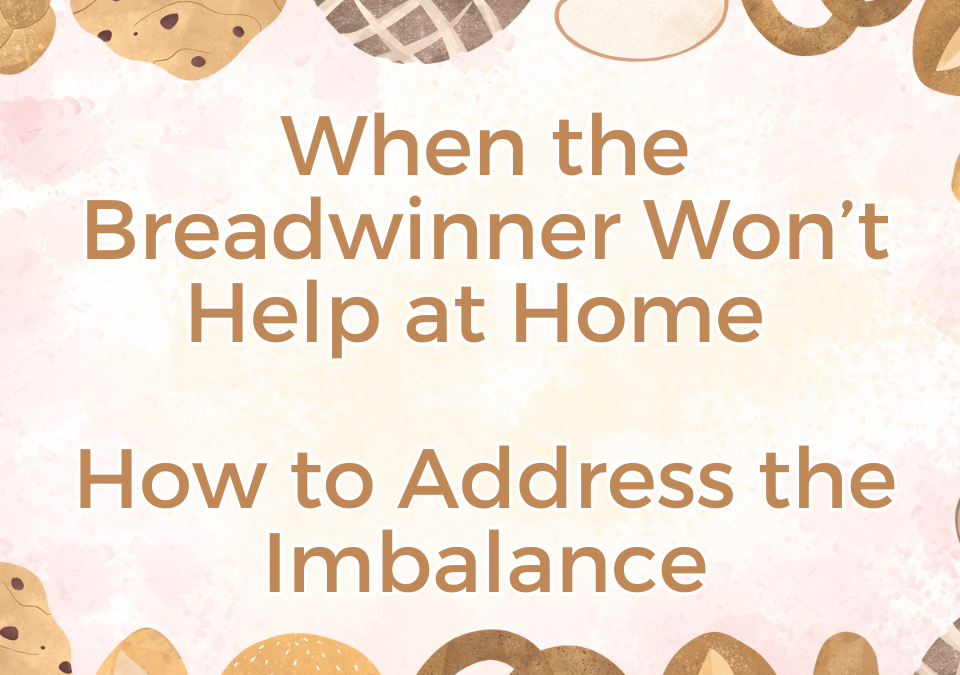
When the Breadwinner Won’t Help at Home: How to Address the Imbalance
If you’re working part-time, taking care of all the household chores, managing childcare, cooking, cleaning, and performing emotional labour, it’s tough to hear your partner ask, “What do you bring to the table?”—especially when your contributions mirror an economic powerhouse. In the UK, unpaid household service work, including childcare and domestic chores, has been valued at £1.24 trillion—around 63% of GDP.
That’s not “helping out”—that’s work that underpins the entire economy. When your role combines paid work with this invisible labour, your contribution is far more significant than many people realise.
“If Seth regarded the 12 minutes it would have taken him to clean up our front lawn as more valuable than the same 12 minutes it took me, how could I ever expect him to take on more of the domestic workload?”
Eve Rodsky drives home that mutual respect for each partner’s time and valuing time equally is foundational to fair division of labour.
- Recognise the Full Scope of Your Contributions
It’s easy for anyone to overlook the invisible labour of running a household, but it’s just as important as financial contributions. If you’re working part-time and still managing childcare, household chores, cooking, cleaning, and emotional labour, you’re juggling multiple roles that are essential to your family’s well-being.
- Financial Contribution: While the amount may not be as large as your partner’s, your income still contributes to the family’s economic stability. The fact that you’re working while balancing all other tasks should not be overlooked.
- Household Labour: You’re responsible for the day-to-day operations of your home—keeping it clean, organised, and running smoothly, which often goes unnoticed but is crucial for family life.
- Emotional Labour: The mental load of remembering appointments, managing family logistics, attending to emotional needs, and providing support to everyone in the family is vital. It’s not just about doing the tasks—it’s about ensuring everyone’s needs are met.
When your partner asks, “What do you bring to the table?” it’s important to remember that your contributions are vast and essential. Your financial contribution may be smaller, but it still matters, and the work you do at home is just as important.
“Unpaid household and emotional labour carries an immense economic weight — valued at roughly £8.6 trillion globally each year. That’s a stark reminder: what you do in the home, though often invisible, has extraordinary value.”~ Oxfam
- Communicate Clearly About Your Contributions
The key to shifting your partner’s perspective is communication. If they don’t see the full scope of your role, it’s time to explain it. You’re not just “staying at home” or “working part-time”—you’re fulfilling a critical role that allows the household to run efficiently.
You might say something like: “I may not bring in as much money as you, but I am contributing financially through my part-time job, and I’m also taking care of the kids, cleaning, cooking, and handling the emotional needs of the family. The work I do—both financially and within the home—is what keeps everything running smoothly. It’s not just about the paycheque; it’s about the balance we create as a family.”
By framing the conversation this way, you’re showing that your financial contribution is valuable while also emphasising the importance of the invisible labour you’re shouldering.
“Every domestic task takes time, and the minutes quickly add up.” ~Eve Rodsky
A concise, powerful reminder that even small, often-overlooked tasks contribute to real exhaustion and imbalance.
Dr. Elyse McNeill, Clinical Psychologist
On making the invisible mental load visible:
“You’ve got to make it visible and regularly to your partner… Once it’s made visible… partners… can honour that with some gratitude.” Mama Matters
This gives a practical tool: verbalising daily contributions can shift household dynamics and recognition.
- Address the Imbalance in Household Labour
“It’s not all on me. It’s on us. Our home and family are both of our responsibilities.” ~Eve Rodsky
Shared responsibility; caregiving and household roles are joint accountability—not assumed defaults—and echoes where the conversation should go: partnership.
Your partner’s question may signal an imbalance in how the household duties are being divided. If you’re working part-time and doing most or all of the household tasks, it’s time to discuss a more balanced division of labour. Every partnership should be rooted in fairness and mutual support.
Try saying: “I understand that your job is demanding, but I’m also managing a lot at home and contributing financially. We need to talk about how we can divide the tasks more fairly. It’s important that we both feel supported in our roles, whether that’s taking turns with childcare, sharing the cooking and cleaning, or having both of us manage the emotional needs of the family.”
Be specific about how you need support, and ask for changes that can bring more balance to your relationship.
Gemma Hartley (Author of Fed Up: Emotional Labor, Women, and the Way Forward) – “I can do it all, but all of it is not mine to do.”
Fair Play: Share the mental load, rebalance your relationship and transform your life
- Set Boundaries Around Unfair Expectations
If your partner continues to ask, “What do you bring to the table?” and doesn’t seem to recognise your contributions, it might be time to set clearer boundaries. You must stand up for yourself and ensure that both of you are carrying the weight of the household and emotional labour in ways that feel fair.
For example: “I’m working, caring for the kids, managing the house, and handling emotional labour. We both need to contribute equitably to ensure we both feel valued and supported. This isn’t sustainable if I’m doing everything, and I need us to find a better balance.”
Setting boundaries around what is fair and what you expect can create a healthier and more respectful dynamic in your relationship.
Ownership over domestic tasks
“What is fair is not always equal and what is equal is not always fair… stay-at-home parents said that what makes the biggest difference… was whether their partners fully ‘own’ the task(s) they agree to take on.” ~Eve Rodsky
This highlights why a 50/50 split isn’t always the solution; ownership, which includes the thinking and planning behind tasks, encourages less resentment and more balance.Rejecting “we both do it” ambiguity
“…the three most toxic words that have ever been uttered in regard to the home are ‘figure it out,’ and… ‘we both do it.’”
And:
“By ‘both’ it often meant women were thinking of the mustard… then sending their partners to the store… when the partner comes home with the wrong type of mustard…”
She highlights how vague, shared responsibility often defaults back to inequitable expectations and frustration.
The Fair Play Deck: A Couple’s Conversation Deck for Prioritising What’s Important
- Don’t Let Your Partner’s Words Define Your Worth
When your partner asks, “What do you bring to the table?” it’s easy to internalise this as a reflection of your worth. However, it’s important to remember that your contributions—whether financial, physical, or emotional—are incredibly valuable. Your work as a part-time employee, caregiver, and household manager is crucial to the overall success of your family.
Your self-worth is not defined by your partner’s view of your contributions. It’s essential to acknowledge that the work you do is critical, even if it’s not always acknowledged in the way it should be.
- Seek External Support if Needed
If you continue to feel undervalued despite explaining your contributions, seeking support from a trusted friend, family member, or counsellor might help. It’s important to have a support system outside your relationship to help process your feelings and gain a clearer perspective.
In some cases, couples counselling can also help open up communication and ensure both partners feel heard and valued.
- Prioritise Your Own Well-Being
Amid all the tasks you’re managing, don’t forget about yourself. Self-care is essential for maintaining your physical and emotional health. If you’re constantly giving and never receiving, it’s easy to become burned out.
Make time for activities you enjoy, take breaks when needed, and set aside moments to recharge. A balanced relationship is one where both partners feel valued and supported, and you deserve to prioritise your own well-being, too.
Conclusion: Redefining What You Bring to the Table
When your partner asks, “What do you bring to the table?” it’s not just an opportunity to explain your role—it’s a moment to reframe how unpaid labour is seen. In England and Wales alone, unpaid care is worth £162 billion a year, exceeding the NHS budget.
That’s the scale of what’s often dismissed as “just” keeping the home running. Your work—both paid and unpaid—is the foundation of your family’s stability, and it deserves recognition. By communicating clearly, setting boundaries, and insisting on balance, you shift the conversation from defending your worth to making it undeniable.
UK-Based Statistics on Unpaid Labour
- £184.3 billion annually across the UK
Unpaid carers—those providing care without pay—contribute an astonishing £184.3 billion each year, equivalent to a second NHS across all four UK nations. That’s about four times the spending on adult social services.
the Centre for Care - £162 billion in England and Wales alone
In just England and Wales, unpaid care is valued at £162 billion a year—already exceeding the NHS budget for those nations.
sheffield.ac.ukCarers UKbbc.co.ukthe Centre for Care - £15.9 billion from unpaid care in Scotland
Scotland’s unpaid carers contribute care valued at £15.9 billion annually—nearly matching the NHS Scotland budget of approximately £17.8 billion.
Carers UK - £140 billion contributed by young women’s unpaid work
Young women aged 18–30 perform unpaid work—like cooking, cleaning, and caregiving—that adds up to £140 billion annually, surpassing the financial services industry’s contribution.
Young Women’s Trust - Unpaid household service work valued at £1.24 trillion (2016)
According to the ONS, unpaid household service work—including childcare, cooking, and domestic transport—was estimated at £1.24 trillion in 2016, or about 63.1% of GDP.
ons.gov.uk - Up to 70% of UK GDP is estimated in unpaid work
Broader economic estimates suggest the UK’s unpaid labour may account for up to 70% of GDP, depending on the methodology.
Encourage your Toddler to form relationships

I am a preschool and primary school teacher and mum to 3 children. I have been involved in education since 1997 and have trained in a variety of educational specialist areas. It is with this expertise that I write articles to help parents and educators provide quality learning experiences for the children in their care.




